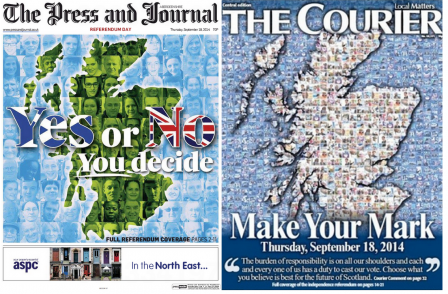
A new survey suggests newspapers played a bigger role in helping Scottish people decide how to vote in the referendum than social media and the campaigns themselves.
Research carried out by YouGov for News UK found that 60 per cent of Scots relied on newspapers and their websites for the majority of their information on the independence debate.
This compared to 54 per cent who said they obtained their information from social media and 44 per cent from the ‘Yes’ or ‘No’ camps directly.
The most popular source of information was television and radio with 71 per cent.
The research results are set to be unveiled today by News UK chief executive Mike Darcey at the News on the Move journalism conference organised by Press Gazette and hosted by News UK.
Darcey said: “Just think about that for a minute. In the recent Scottish referendum, held at a time when the digital revolution was in full flow, newspapers played a more significant role than either social media or the political campaigns themselves.
“Newspapers remain central to healthy political debate and the Scottish referendum just proved it”, he added.
Darcey highlighted the Sunday Times YouGov survey published on 7 September 2014 as a key moment in the debate.
“It was the Sunday Times poll, showing the ‘yes’ camp ahead, that threw the ‘no’ campaign into turmoil and sparked an entirely new debate about the sort of powers that would be devolved if Scotland voted to retain the Union.”
According to News UK, an extra 70,000 copies of The Times were sold across the UK in the week haeding up to referendum. On the Sunday following the vote, News UK says the Sunday Times sold and extra 20,000 copies.
The survey involved 1,268 Scottish adults and took place from 9 to 11 September ahead of the vote on 18 September.
The survey asked voters how much information about the referendum campaign they got from various sources.
Totalling up those who said they got a significant or very large amount of information about the referendum from various sources here are the totals:
-
60 per cent said newspapers and newspaper websites
-
71 per cent said TV and radio
-
44 per cent said directly from the campaigns themselves
- 54 per cent said social media.
Email pged@pressgazette.co.uk to point out mistakes, provide story tips or send in a letter for publication on our "Letters Page" blog
